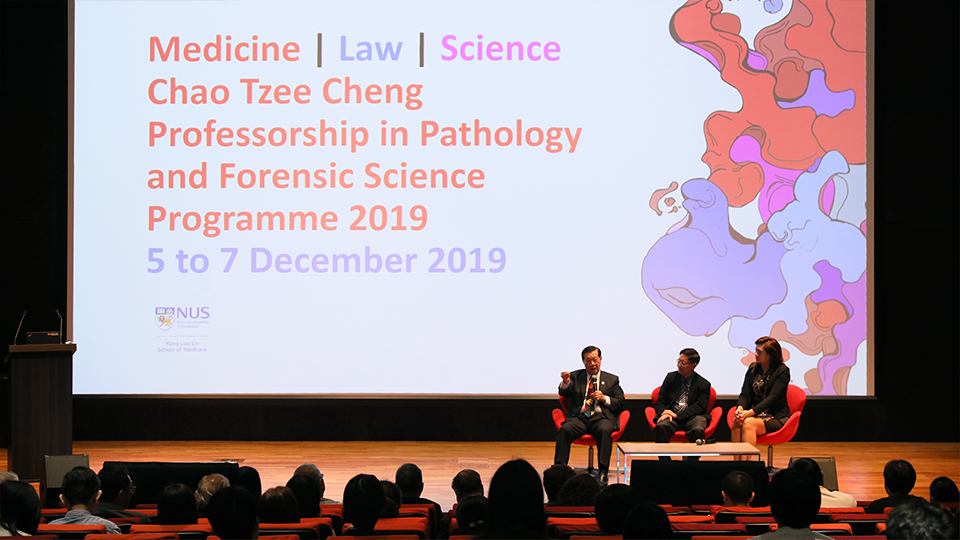Of forensic science, medicine and pathology
Published: 08 Dec 2019

In memory of the late Professor Chao Tzee Cheng, renowned forensic pathologist who elevated Singapore’s level of professionalism in the area, friends, students and colleagues of Prof Chao set up the Chao Tzee Cheng Professorship in Pathology and Forensic Science back in 2002.
As part of its 10th run this year, the Chao Tzee Cheng Visiting Professorship Programme 2019 brought together eminent professors in the fields of pathology, forensic science, law and more to share their expertise and cooperate in research and education.
The programme, organised by the NUS Yong Loo Lin School of Medicine’s Department of Pathology, saw experts discussing various issues in three different tracks – medical, legal and scientific – over a span of three days, from 5 to 7 December 2019.
Medical Dispute Resolution
For healthcare practitioners, medicine is a calling and they devote their lives to helping patients. However, despite the best efforts of doctors and nurses, things can sometimes go wrong. How can society strike a balance between ensuring the welfare of patients and the rise of defensive medicine and escalating healthcare costs? Is there a better way to resolve medical disputes than litigation?
Associate Professor Peter Manning (Emeritus Consultant, Emergency Medicine Department, National University of Hospital) started the session by sharing insights on medical dispute resolution, specifically the role of mediation and the facilitation of family meetings dealing with medical disputes at early stages.
Mr Lek Siang Pheng (Deputy Managing Partner, Dentons Rodyk), an experienced lawyer in medico-legal disputes, then provided a fresh perspective as he gave his take on family meetings from a lawyer’s point of view.
Following which, Ms Cheryl Guan (Divisional Director of Financial Lines Group (Healthcare), Jardine Lloyd Thompson) discussed the different social determinants of health and drivers of escalating healthcare costs in developed nations.
The Friendship between a Forensic Scientist and a Forensic Pathologist
NUS Medicine welcomed Dr Henry Lee, one of the world’s foremost forensic scientists who has dedicated his life to the field of forensic science in the pursuit of justice, as a visiting professor in this year’s Chao Tzee Cheng Professorship Programme.
“Professor Chao is a friend. I really miss him, I’ve learnt so much from him,” said Dr Henry Lee.
In honour of the late Prof Chao Tzee Cheng, Dr Lee shared about his friendship with Prof Chao and their lives – one as a forensic pathologist and another, as a forensic scientist – during one of the programme’s public lectures.
From working together on complex cases to candid moments such as being moved by the late Prof Chao’s singing after work hours, Dr Henry Lee reminisced about how their paths crossed and other fond memories he shared with the late Prof Chao Tzee Cheng.
“He’s a teacher, he’s a friend, and most importantly, he changed our world.” – Dr Henry Lee
Prof Chong Yap Seng, Dean of NUS Medicine said, “Professor Chao was a larger than life character whose legacy can be said to be built upon decades of solving previously unsolvable, complex murder cases. But it was his steadfast belief of upholding justice as well as his role in educating young doctors in medical dispute resolution that sealed his legacy.”


Assoc Prof Tan Soo Yong, Head of the Department of Pathology at NUS Medicine also paid tribute to the late Prof Chao – his “mentor, teacher, leader and most of all, friend”. Assoc Prof Tan shared his experience working with Prof Chao and how he was an innovator who was truly ahead of his time. Prof Chao taught Assoc Prof Tan that one should not let the present limitations hinder you and one should set one’s mind free. He added that Prof Chao often told him that “it may not work today, but it may work tomorrow” and how one should not gripe, but do something about the situation.
Dr Henry Lee, Assoc Prof Tan and Assoc Prof Stella Tan (NUS Department of Biological Sciences, Faculty of Science) were also part of a panel discussion during one of the programme’s public lectures where they engaged the audience in the role of forensic science and pathology in solving difficult cases.
Additionally, Dr Henry Lee shared insights on the opioid crisis in the United States; adding that other than forensics and law enforcement, education, policy and health practitioners would all need to play a part to alleviate the drug-related problems in the country.
Medical Innovation and the Legal Implications
Science and innovation have the tendency of advancing ahead of the law. What are the legal and ethical implications of medical innovation and novel technology?
Assoc Prof Terry Kaan (Co-Director of the Centre for Medical Ethics & Law in the University of Hong Kong) discussed the legal implications of Artificial Intelligence (A.I.) and other innovations in medicine; while Dr T. Thirumothy (Executive Director, SMA Centre for Medical Ethics and Professionalism) shared about the ethical aspects of medical innovation in modern societies and how medical practice can better embrace improvement with new technology.
Ending the session, Prof Michael Hor (Dean of the Faculty of Law in the University of Hong Kong) discussed recent developments in the use of medical expert evidence and the role of doctors in court.
News Coverage
















